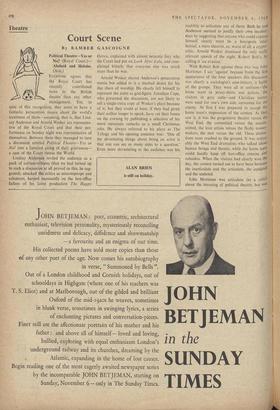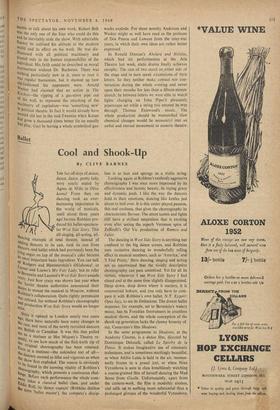Theatre
Court Scene
By BAMBER GASCOIGNE Political Theatre—Yes or No? (Royal Court.)— Abelard and Heloise. (Arts.)
EVERYONE agrees that the Royal Court has recently contributed more to the British theatre than any other management. Yet, -in spite of this recognition, they seem to have a fantastic persecution mania about the world's treatment of them—assuming, that is, that Lind- say Anderson and Arnold Wesker are representa- tive of the Royal Court and that their per- formance on Sunday night was representative of themselves. Between them they managed to turn a discussion entitled Political Theatre—Yes or No? into a frenzied airing of their grievances— a case of the Court versus the World.
Lindsay Anderson reviled the audience as a pack of culture-vultures (that we had turned up to such a discussion at all proved us this, he sug- gested), attacked the critics as nincompoops and saboteurs, harped incessantly on the box-office failure of his latest production The Happy Haven, explained with almost neurotic fury why the Court had put on Look After Lulu, and com- plained bitterly that everyone else was much nicer than he was.
Arnold Wesker shared Anderson's persecution mania but added to it a marked desire for his due share of worship. He clearly felt himself to represent the artist as god-figure. Jonathan Cape, who presented the discussion, are not likely to sell a single extra copy of Wesker's plays because of it; but they could at least, if they had given their author longer to speak, have cut their losses on the evening by publishing a selection of his more messianic remarks as a small Christmas joke. He always referred to his plays as The Trilogy and his opening sentence was: 'One of the devastating things about being an artist is that one can see so many sides to a question.' Even more devastating to the audience was his ALAN BRIEN is still on holiday.
inability to articulate any of them. Both he and Anderson seemed to justify their own incoher- ence by suggesting that anyone who could express himself clearly must be a bourgeois intel- lectual, a mere theorist, or, worst of all, a crypto- critic. Arnold Wesker dismissed the only really relevant speech of the night, Robert Bolt's. by calling it 'an evasion.'
With Robert Bolt against these two was Joh" Mortimer. I say 'against' because from the lint appearance of the four speakers this discussion was clearly a sociologist's case-history, a battle of the groups. They were all in uniform—the home team in jersey-shirts and jackets, the visitors in grey suits—and Christian names were used for one's own side, surnames for the enemy. At first I was prepared to accept the home team's impression of the contest. As they saw it, it was the progressive theatre versus the West End, the committed versus the unconl- mitted, the lean artists versus the fleshy money- makers, the new versus the old. These distinc- tions soon crashed to the ground. It was notice- ably the West End dramatists who talked about human beings and theatre, while the home team could hardly keep off box-office returns and subsidies. When the visitors had clearly won the day, the contest turned out to have been betN% the inarticulate and the articulate, the outdated and the undated. John Mortimer was articulate (as a critic) about the meaning of political theatre, but was unable to talk about his own work. Robert Bolt was the only one of the four who could do this and he inevitably stole the show. With admirable fluency he outlined his attitude to the modern world and its effect on his work. He was dis- illusioned with all political machinery and trusted only in the human responsibility of the Individual. His faith could be described as moral rearmament without Dr. Buchman. There was nothing particularly new in it, since -at root it Was regular humanism, but it showed up how old-fashioned his opponents were. Arnold Wesker had claimed that an action in The kitchen—the ripping of a gas-stove pipe out of the wall, to represent the smashing of the Machinery of capitalism—was 'something new' in Political theatre. In fact it would already have seemed old hat in the mid-Twenties when Kaiser had gone a thousand times better (in an equally 'ad Play, Gas) by having a whole symbolical gas- works explode. For sheer novelty Anderson and Wesker might as well have read us the prefaces of Dos Passos and Lawson from the inter-war years, in which their own ideas are rather better expressed.
In Ronald Duncan's Abelard and Heloise, which had six performances at the Arts Theatre last week, static drama finally achieves atrophy. The cast of two stand on either side of the stage and in turn speak adaptations of their letters. So they neither make contact nor con- versation during the whole evening and never open their mouths for less than a fifteen-minute stretch. In between letters we were able to watch lights changing on John Piper's pleasantly piperesque set while a string trio emoted its way through Thomas Eastwood's music. The whole production should be mummified (few chemical changes would be necessary) into an awful and eternal monument to esoteric theatre.















































 Previous page
Previous page